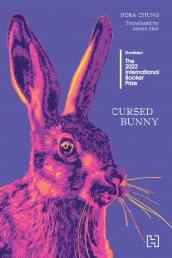



Bora Chung’s Cursed Bunny, which was shortlisted for the International Booker Prize last year, is funny, startling, moving, and original. The short stories in this collection hop from one genre to another as though they are theme park rides. A typical horror story in Chung’s hands is as brutal as a slasher movie, but there’s also a touch of sadness to it. And the one quality that I admired the most about the collection is that it gets weirder and weirder with every turn of the page.
 ‘Cursed Bunny’ by Bora Chung; translated by Anton Hur (2023, Hachette India, 256 pages, Rs 599).
‘Cursed Bunny’ by Bora Chung; translated by Anton Hur (2023, Hachette India, 256 pages, Rs 599).If I have to slot Cursed Bunny into a particular category, I would gladly place it next to Han Kang’s The Vegetarian (2007). Although they are both disturbing on the outside, they open up our minds to several different worlds at once. In the opening story, named The Head, the protagonist encounters a talking head in the toilet. The entire story doesn’t take place within the walls of the bathroom obviously, but the “head” doesn’t live anywhere else. It’s a bizarre image that doesn’t quite make sense at first. However, as the head begins to have conversations with the protagonist, eccentricity makes way for believability.
The Head leans on the tropes of science fiction without borrowing the genre’s tools outrightly and emerges as the clear winner in the collection. If there’s another story that has the same verve as this one, it is Snare. Chung, again, fills Snare with an air of terror, in which a man finds out that a fox, he chances upon in a forest, bleeds gold. The man, naturally, gets greedy and comes up with an awful plan in order to keep the animal bleeding. He won’t get the gold — and the riches it brings — if the fox dies, though. He’s not a fool; he knows how to play this game well.
The injuries that the guy inflicts on the fox find a beastly reflection in Scars where a boy gets injured by a monster. But this boy is innocent. The monster, which is referred to as “It”, would “insert a sharp, hard thing into the boy’s vertebrae and suck”. Scars ends on a note of bitterness. As a matter of fact, Chung doesn’t care for closures that veer towards relief. She seems to derive comfort by painting small, unsettling interiors.
The flaws that surround her characters are also common since emotions, such as greed and jealousy, are omnipresent. Who doesn’t dream of possessing luxuries? In The Embodiment, a woman, who gets “pregnant under abnormal circumstances,” has to look for a male partner. If she cannot find one, then, “the cells of the fetus will not properly propagate or grow.” And in the eponymous story, from which the title has been taken, there’s really a cursed bunny.
I read these tales over the period of a week even though I could have powered through them in a single day. But I wanted to savour Chung’s narrative spirit. She’s at her best while building the plots because she keeps adding layers upon layers. If you skip a paragraph, you won’t be able to grasp the nuances of her supernatural universe.
There’s some amount of philosophical depth in her words, too. Here’s a sample from Reunion, “For some people, their lives are ruled by one shocking event reverberating through their survival instincts. Life shrinks into a trap made up of a shimmering moment in the past, a trap where they endlessly repeat that singular moment when they were surest of being alive. That moment is short, but long after it has passed, good times as well as bad slip like sand through their fingers as they meaninglessly repeat and confirm their survival.”
I didn’t like the way Reunion was packed. I thought it was a bit rough on the edges, but it didn’t stop me from enjoying the gloomy passages. I’ll rank the directness of The Head and Ruler of the Winds and Sands, which is firmly grounded in fantasy, higher since their magical allure doesn’t rely on the imaginations of the readers.
The Japanese author Mieko Kawakami, in Heaven (2009) and All the Lovers in the Night (2011), lays bare the effects of bullying and loneliness, respectively, by creating characters and situations that are inimitable. Chung does something similar in Cursed Bunny, albeit without holding on to the ropes of realism. Some of her freewheeling stories have morals hidden within their folds, but if you don’t want to actively keep an eye on them, that’s okay, too. I’m just glad that Korean fiction is rising in popularity along with its cinema. What does this mean then? More books and pleasures for us, of course.
Discover the latest Business News, Sensex, and Nifty updates. Obtain Personal Finance insights, tax queries, and expert opinions on Moneycontrol or download the Moneycontrol App to stay updated!
Find the best of Al News in one place, specially curated for you every weekend.
Stay on top of the latest tech trends and biggest startup news.